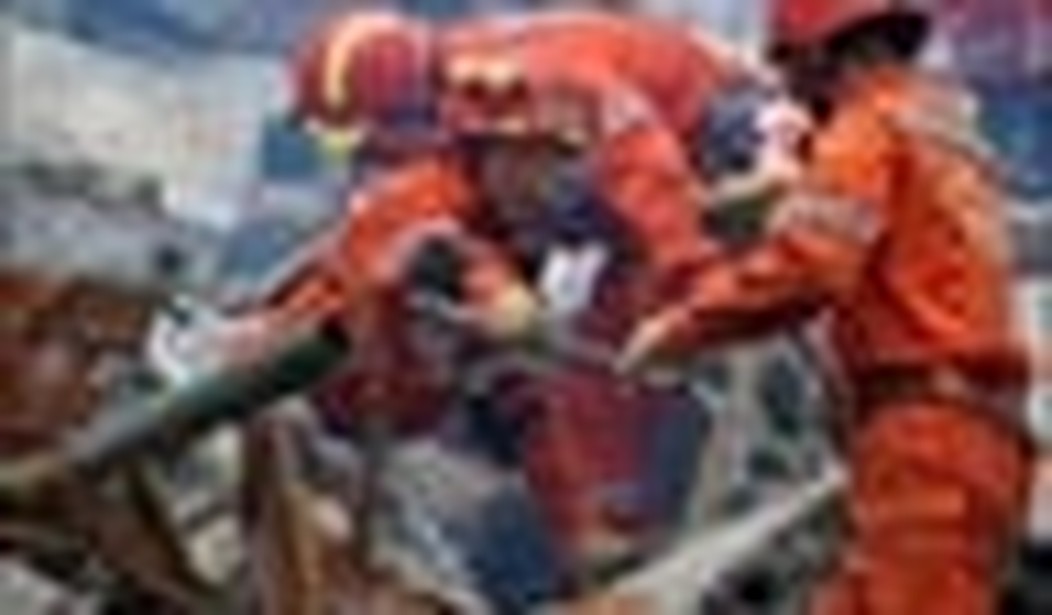Monday’s 7.9 earthquake in Sichuan province has killed, at last official count, almost 29,000. Perhaps as many as 20,000 are still trapped in rubble, and Beijing has estimated that the death toll will eventually exceed 50,000. The quake has injured countless more and devastated an important region of the country. But what will the disaster do to China’s increasingly fragile political system?
The connection between natural and human events is embedded firmly in the Chinese psyche and was reinforced when Mao Zedong, the founder of the People’s Republic, died less than two months after the Tangshan quake of July 1976 in which at least 240,000 people perished. So it was no surprise that Chinese have begun to connect Monday’s calamity with impending political change. For some of them, the disaster was a sign that the Communist Party had lost the Mandate of Heaven and would therefore fall soon. “The Gods Reprimanded the Chinese People?” asked one blogger last week. People wonder, because the first few months of this year have brought two other horrible events, an unusual snow storm that blanketed much of the country in January and February and a deadly train collision in April.
The atheistic Communist Party, obsessed with its own survival, worries about the superstitions of the Chinese people. It is no coincidence, for instance, that Beijing has scheduled the opening ceremony for this summer’s Olympics to begin at the eighth minute of the eighth hour past noon of the eighth day of August, the eighth month of the year 2008. Government officials connected the Summer Games to auspicious number eight, but since Monday people have turned Chinese-style numerology against the country’s leaders. The quake, people say, struck China on the 88th day before that ceremony is supposed to begin. Moreover, there is a widely circulating text message that ties the dates of Monday’s disaster, the recent Tibetan riots, the Olympics, and the great snowstorm to the same number. For many Chinese, eight has taken on a dark meaning this year.
Yet 2008 is by no means over. “The worst might be yet to come,” says Chen Wei, who runs a website in Beijing, referring to the symbolism of the five Fuwa, the mascots for the Summer Games. Four of the cute creatures have already been linked to disasters that occurred this year (Jingjing, the panda Fuwa, is thought to represent the quake because of that animal’s Sichuan habitat). According to many, Beibei, a sturgeon, now foretells one more horrible event before the Olympics begin.
China does not need another tragedy in 2008, but, even if one occurs, it’s not clear that this year would be appreciably worse than any other in the last decade. The quake, although horrific, is just the latest in a series of calamities that has befallen the Chinese in recent years. The significance of Monday’s cataclysmic event, however, is that it may end up changing the mood of the country at a crucial moment in its development. For example, some Chinese have become indignant in the last few days as the central government published triumphant photos of the Olympic torch’s arrival in Fujian province for the nationwide relay while rescuers desperately fought to save lives in Sichuan. And despite the near universal pride in the Summer Games, there have been calls for Beijing to declare a moratorium to the relay and even to cancel it outright. Officials had originally refused to change their plans because “the earthquake-stricken area is not on the route of the torch relay,” but they later acceded to popular demand by toning down the celebrations. The result is that the relay in Jiangxi province has been more somber , yet the government still plans to bring the torch to devastated Sichuan in the middle of next month. The quake, therefore, shows that Beijing officials have yet to understand the depth of feeling among the Chinese people.
The failure to stop the torch relay exposes a wider gap between the people and their government and is another sign that the country’s one-party system is having difficulty keeping up with a rapidly modernizing society. In the early days of the People’s Republic, China’s people, for various reasons, did not question their leaders. For example, thirty or so million died in the Great Leap Forward without protest against Mao Zedong’s absurd policies. Today, in a very different China, that’s no longer true.
As the shock wears off, survivors are beginning to realize that the quake did not kill their wives, husbands, parents, and children; it was their government. Their government did not write or enforce building codes appropriate for an earthquake zone, did not retrofit unsafe structures, did not prevent shoddy construction, and did not accept help from the international community when it was offered and could have done some good.
The Communist Party, of course, did not cause the quake, but it is now being held responsible — and properly so — for deaths that should never have occurred. And if the Chinese people are speaking up now, it is because they have seen recent calamities that were caused or made worse by the government’s grave policy mistakes or by the flaws inherent in communism, such as secrecy, corruption, unaccountability, and disregard for human life. As a result, the Chinese populace has become more demanding. As Bi Kaiwei, who lost his daughter in a school collapse in Sichuan on Monday, said, “The people responsible have to be held accountable.”
As a result of mounting public anger over the quake, the greatest challenge for Beijing at this point is not saving lives — which it has largely failed to do — but to save itself. The weeks and months ahead will be difficult for Chinese leaders as they get ready for the Olympics — and as they dig themselves out of a disaster that they themselves helped to create.
Gordon G. Chang is the author of The Coming Collapse of China.









Join the conversation as a VIP Member